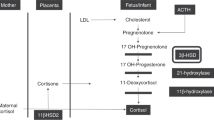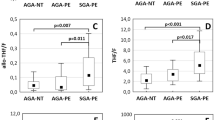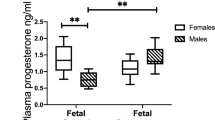Abstract
IT is well known that the free fraction of plasma cortisol is increased in pregnancy1, but it has not been established whether this is a result of maternal pituitary or placental adrenocorticotrophic hormone (ACTH) secretion. Maternal plasma ACTH levels in human pregnancy have been variously reported as elevated2, or depressed3; but there is no information on the relationship between ACTH levels and the stage of gestation. We now report that maternal ACTH levels increase progressively throughout pregnancy, that urinary free cortisol levels are raised and show resistance to suppression by dexamethasone and we present evidence suggesting that ACTH may be produced by the placenta.
This is a preview of subscription content, access via your institution
Access options
Subscribe to this journal
Receive 51 print issues and online access
$199.00 per year
only $3.90 per issue
Buy this article
- Purchase on Springer Link
- Instant access to full article PDF
Prices may be subject to local taxes which are calculated during checkout
Similar content being viewed by others
References
Burke, C. W., and Roulet, F., Bri. Med. J., i, 657–659 (1970).
Genazzani, A. R., Fraioli, F., Hurlimann, J., Felber, J-P., and Fioretti, P., Clin. Endocr., 4, 1 (1975).
Mukherjee, K., and Swyer, G. I. M., J. Obstet. Gynaecol. Br. Commonw., 79, 504–512 (1972).
Rees, L. H., et al., Endocrinology, 89, 254–261 (1971).
Orth, D. N., in: Methods of Hormone Radioimmunoassay, (edit by Jaffe, B. M., and Behrman, H. R.), 140 (Academic, New York and London, 1974).
Ratcliffe, J. G., Knight, R. A., Besser, G. M., Landon, J., and Stansfeld, A. G., Clin. Endocr., 1, 27–44 (1972).
Lyons, W. R., Proc. soc. exp. biol. Med., 35, 645 (1937).
Chayen, J., Loveridge, N., and Daly, J. R., Clin. Endocr., 1, 219–233 (1972).
Beardwell, C. G., Burke, C. W., and Cope, C. L., J. Endocr., 42, 79 (1968).
Galvao-Teles, A., and Burke, C. W., Lancet, i, 737–740 (1973).
Simmer, H. H., et al., Am. J. Obstet. Gynecol., 119, 283–296 (1974).
Allen, J. P., Cook, D. M., Kendall, J. W., and McGilvra, R., J. clin. Endocr. Metab., 37, 230–234 (1973).
Dokumov, S. I., Milanov, S. C., and Trepetshov, S. P., J. Obstet. Gynaec. Br. Commonw., 81, 220–221 (1974).
Jailer, J. W., and Knowlton, A., J. clin. Invest., 29, 1430–1436 (1950).
Opsahl, J. C., and Long, C. N. H., Yale J. Biol. Med., 24, 119–209 (1951).
Lundin, P. M., and Holmdahl, S., Acta Endocr., Copenh., 25, 388–394 (1957).
Rees, L. H., and Ratcliffe, J. G., Clin. Endocr., 3, 263–299 (1974).
Author information
Authors and Affiliations
Rights and permissions
About this article
Cite this article
REES, L., BURKE, C., CHARD, T. et al. Possible placental origin of ACTH in normal human pregnancy. Nature 254, 620–622 (1975). https://doi.org/10.1038/254620b0
Received:
Accepted:
Published:
Issue Date:
DOI: https://doi.org/10.1038/254620b0
This article is cited by
-
Anatomical and physiological alterations of pregnancy
Journal of Pharmacokinetics and Pharmacodynamics (2020)
-
Regulation of progesterone production in human term trophoblasts in vitro by CRH, ACTH and cortisol (prednisolone)
Archives of Gynecology and Obstetrics (2005)
-
Cloning and characterization of the cDNAs for human and rat corticotropin releasing factor-binding proteins
Nature (1991)
Comments
By submitting a comment you agree to abide by our Terms and Community Guidelines. If you find something abusive or that does not comply with our terms or guidelines please flag it as inappropriate.



